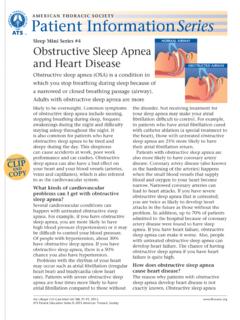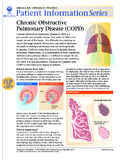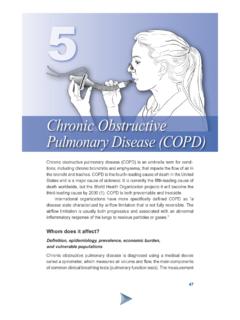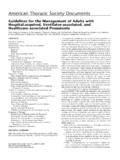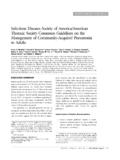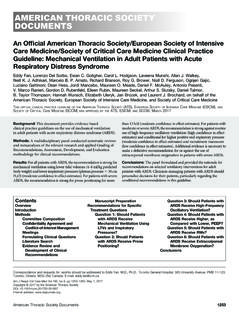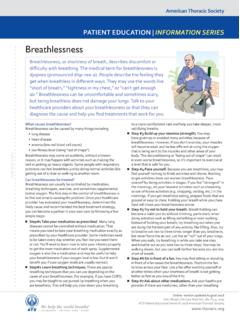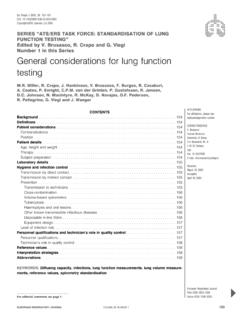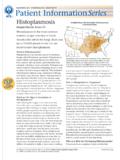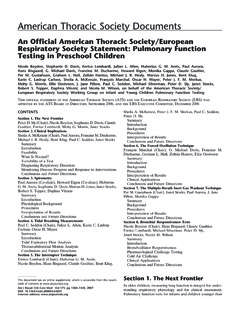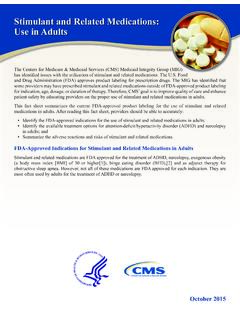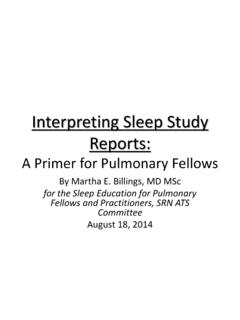Transcription of Oral Appliances for Sleep Apnea in Adults
1 American Thoracic SocietyPATIENT EDUCATION | INFORMATION AND COPYOral Appliances hold your tongue in place so that your airway stays open while you Sleep . oral Appliances are placed into your mouth at night before you go to bed, and worn for the entire time you are sleeping, and taken out when you are do oral Appliances work? oral Appliances work by pushing or pulling your lower jaw forward. By doing this, your tongue is kept in a position that does not block your airway. This reduces the risk of snoring or that your tongue may obstruct your airway during Sleep . If this device is helping you, the sound of snoring should be gone entirely or lessened. How effective are oral Appliances ?As with all treatments, not everyone gets the same benefit from oral Appliances . For some, the OSA and snoring go away completely, while for other people, other forms of treatment are needed.
2 oral Appliances are more likely to work if you have mild or moderate Sleep Apnea ; more recent evidence supports use for some people with severe Sleep Apnea as well. If your Sleep Apnea gets better when you lie on your side (compared to sleeping on your back) and if you are not overweight, you are also more likely to benefit from this appliance. If you have central Sleep Apnea (a less common condition than OSA), then oral Appliances are unlikely to be helpful. Until you have been properly fitted for an oral appliance and tried it, no one can know how well it will work for well do oral Appliances work compared to CPAP?CPAP (Continuous Positive Airway Pressure) is a reliable treatment for Sleep Apnea . Immediate results are typically seen with CPAP regardless of how bad the Sleep Apnea is. An oral appliance will usually improve your Sleep Apnea , but may not completely control it.
3 If you have moderate or severe OSA, CPAP is more likely to work to correct your Sleep Apnea than an oral appliance. However, an oral appliance may be a better option than no treatment at all if you cannot tolerate CPAP. oral Appliances are also not the main therapy if you have significant heart disease or are very sleepy during the day. In these cases, CPAP is the best treatment. A Sleep specialist can provide guidance regarding the most appropriate therapy for you. For more information see the ATS Patient information series piece on Continuous Positive Airway Pressure for Adults with obstructive Sleep Apnea at there any side effects from using oral Appliances ?If fitted well, the oral appliance should be comfortable during the night. However, because it acts to push your jaw forward, some people feel discomfort when first using the appliance. This discomfort tends to improve as you use it more.
4 If discomfort happens, it is usually in the joint at the back of your jaw, just in front of the ear (the temporomandibular joint). This discomfort should go away when you take the appliance out in the morning. Also, oral Appliances may cause increased saliva in your mouth, or make your teeth feel tender. These symptoms usually settle down quickly the more you use the device. Over time, there may be tooth movement, changes in your bite, or problems with the joint and muscles of your jaw. It is important to have regular follow-up visits with the dentist who supplied you with the appliance to detect and manage problems Appliances for Sleep Apnea in AdultsOnline Version Updated January, 2018 ATS Patient Education Series 2013 American Thoracic SocietyOral Appliances are devices that can be used to treat some people who have mild or moderate obstructive Sleep Apnea (OSA) and snoring.
5 There are different types of oral applicances. Common ones include: Mandibular Advancement Devices (MAD), Mandibular Advancement Splints (MAS), Mandibular Repositioning Appliances (MRA), or Tongue Retaining Devices (TRD).American Thoracic SocietyPATIENT EDUCATION | INFORMATION can I get an oral appliance?Your healthcare provider can refer you to a Sleep specialist in order to find out how bad your Sleep Apnea is. This evaluation usually requires an overnight Sleep study and a separate follow-up appointment with your Sleep specialist to talk about the results and discuss possible treatment options. If you decide to try an oral appliance, your Sleep specialist will refer you to a dentist who has extensive training in the treatment of OSA. For more information about Sleep studies see ATS Patient Information Series Sleep Studies in the Sleep Laboratory and at Home at the appliance need to be specially fitted for me?
6 Each person has a different mouth and jaw shape, so you should have the oral appliance made to fit you. Your dentist will take an impression of your teeth and send the dental impression (dental mold) to the lab for the appliance to be made. After a few weeks, you will go back to the dentist s office, where the appliance is fitted into your mouth. It will be adjusted so that it moves your jaw forward to a position that will be effective but is still comfortable. Your dentist will help supervise the adjustment of the device over several weeks. After the appliance is fitted, follow-up visits with your dentist or Sleep specialist will be are some kinds of dental devices that you can buy over-the-counter (without a prescription). These devices are cheaper, but they usually do not work. They may take up lots of space in your mouth, pushing your tongue toward the throat and making your OSA worse.
7 Getting the proper fitting device is important in helping your Sleep problem. How should I care for my oral appliance?You should brush and floss your teeth before you put your appliance in each night. Your dentist can prescribe fluoride gel to help prevent tooth decay while using your appliance. Plaque can also build up on an appliance. You must therefore clean it daily. Make sure you dry it out each day before using it again. Also, keep your appliance safely away from children and do I know if oral appliance is working?When an oral appliance is working well, there should be no snoring. If you are wearing the appliance because of Sleep Apnea , you may see improved sleepiness, fatigue and other symptoms of Sleep Apnea . A good way to find out if you are getting the help you need from your oral appliance is to have a repeat overnight Sleep study with the oral appliance in place.
8 If the study shows that wearing the oral appliance has helped your OSA, you should continue to use if every night. If it is not helping your Sleep Apnea , other treatments (such as CPAP) will be do I do if my oral appliance does not seem to be working well?If symptoms of snoring or Sleep Apnea return (for example, feeling tired during the day), it is important to have a follow up appointment with your dentist or your Sleep specialist. Your dentist might need to adjust the appliance. After a number of years, some people using an oral appliance find they need to consider other treatments for their OSA, especially if they have had weight : Sutapa Mukherjee MBBS, FRACP, PhD Reviewers: Suzanne C. Lareau RN, MS; James Metz, DDS, DABDSM; Mickey Harrison, DDS; Marianna Sockrider, MD, DrPHThis information is a public service of the American Thoracic Society. The content is for educational purposes only.
9 It should not be used as a substitute for the medical advice of one s health care Resources:American Academy of Sleep Medicine: oral -appliance-therapy/overviewAmerican Sleep Apnea Association: Health Foundation (Australia): Action StepsOral Appliances may be more convenient than other forms of therapy, but make certain if you use one, it is fitted properly and corrects your sleeping issues. Speak with a Sleep specialist to find out if an oral appliance may help you If your appliance is not making your symptoms better, report back to your specialist Keep follow-up appointments with your Sleep specialist &/or dentist Clean your appliance dailyHealthcare Provider s Contact Number.
